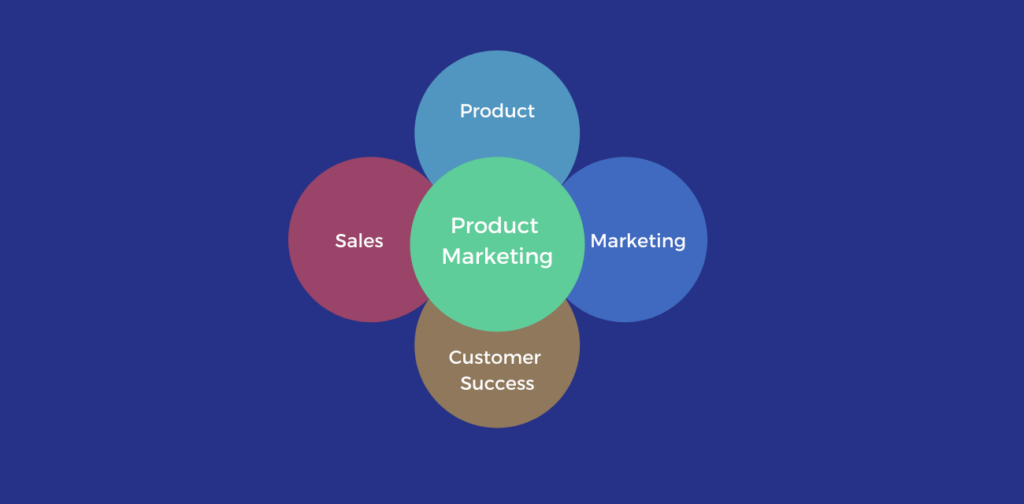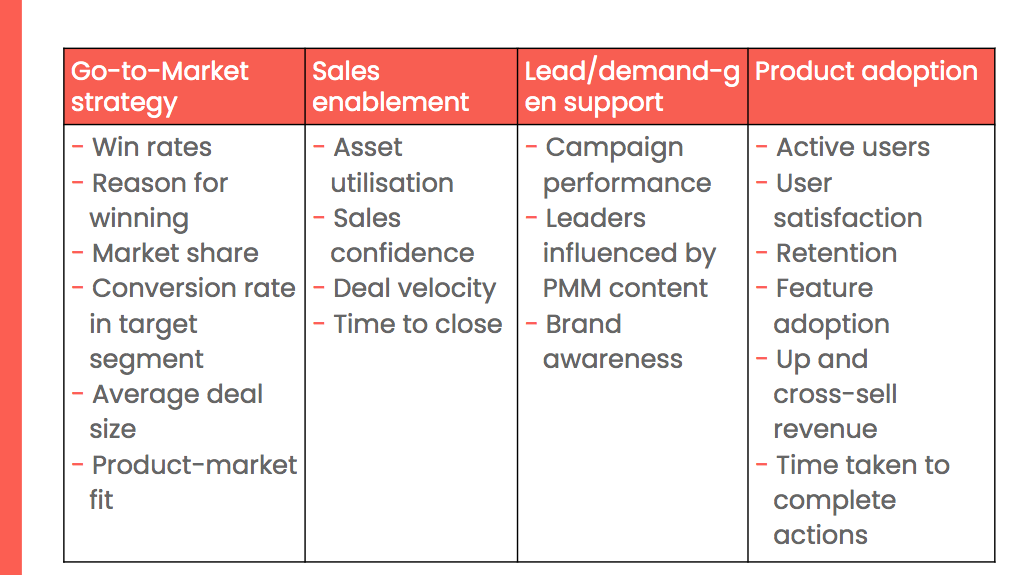
If you’re thinking of hiring a product marketer into your B2B Tech business, then it’s a smart move.
Today, product marketing is making an even greater impact on the growth and success of all types of companies.
Why?
Well, put simply, product marketing is a key lever to help you understand what the market needs, help define what those products should look like, and then how to take those products to market in a way that makes it irresistible for your prospects to buy.
But that doesn’t mean ‘doing’ product marketing is easy. And product marketing can mean many different things, depending on what stage of growth your business is at.
The best way to move forward with product marketing is to have a clear strategy. And in this guide, we’ll help you understand what product marketing is, what it can do for your business, and how to hire a product marketer to transform your business’ results.

Product marketing is responsible for bringing new products to market, which includes understanding the competitor landscape, developing product positioning, creating the product messaging, and then setting the go-to-market while supporting sales with the tools they need to sell better.
It may seem like a lot, and in truth, it is. And that’s because product marketing is the linchpin between sales, marketing, customer success, and product management.
Because of that, good product marketing and a good product marketing professional, will have a big impact on the success of your product and your business.
About to start hiring? Check out our Product Marketing Job Descriptions to give you a head start
Now, some of you might be scratching your head and thinking, ‘well, we’ve got a Product Manager that does most of that’.
And it’s certainly true that Product Managers are responsible for product launches.
However, the two roles are very different.
At a top level, Product Managers are responsible for creating products, whereas Product Marketers are responsible for taking those products to market.
It’s not uncommon in smaller companies for someone to perform both roles. There might be someone in your business who has a Product Manager title, who also conducts product marketing tasks, and vice versa.
But in most successful B2B Tech companies, there will be two separate roles.
For a B2B Startup, we’d go so far as saying a Product Marketer needs to be the first hire into your marketing team.
And that’s for a few reasons;

A Product Marketer’s responsibilities can vary depending on factors such as a company’s growth stage, the seniority of the role or the particular product you’re marketing.
However, there are seven core responsibilities that Product Marketers have:
Research is a critical part of product marketing because it’s impossible to launch and market a product successfully without it.
And that research needs to be a balance of qualitative and quantitative research. The best product marketers are those that are regularly talking to prospects and customers.
Research that a product marketer will do includes;
Getting the price of your product is crucial. Because if you charge too little, you’re leaving revenue on the table, and if you charge too much, you’ll be losing out on sales to your competitors.
Pricing doesn’t always form part of a Product Marketer’s responsibilities. Sometimes this responsibility does sit with other teams.
However, if you’re thinking of adding it in, there are four core pricing models to think about.
A Product Marketer will take responsibility for setting the Objectives and Key Results (OKRs).
Setting these objectives help a business understand what it’s trying to achieve from a particular activity, and more importantly how they know they’ve achieved it.
The Product Marketing Alliance, in their flagship Product Marketing Course, breaks down OKRs across the various responsibilities of a Product Marketer and gives some examples to help you determine what yours might be.

Persona’s are a fundamental part of product marketing, and any marketing for that matter.
And that’s because it’s important to understand your audience before you start to market to them or even create products for them.
Persona’s are fictional characters that you create based on segments of your market.
And they help in a number of ways;

Positioning should be done before you move onto your messaging. A Product Marketer will define the clear benefits your product brings to the market. Whereas messaging is focussed on what’s said externally to prospects and customers about your product.
The messaging uses those key benefits from your positioning work in the marketing used to create demand.
And good positioning helps you answer some key questions early on;
A Product Marketer’s job is to take everything we’ve discussed so far and then build a Go-To-Market (GTM) strategy.
And a GTM strategy will encompass three main areas;
A key aspect of this process is to communicate the GTM strategy with teams across sales, marketing and product.
And Product Marketer’s will involve sales leaders early on in the process, to jointly develop the Sales Strategy, to help with buy-in and execution.

Again, depending on the structure and size of your business, sales enablement may fall under the responsibilities of a Product Marketer, or lie with a dedicated sales enablement team or even with the marketing team.
The role of sales enablement is to provide sales teams with the information, content and tools to engage prospects throughout the buying journey and help convert them to customers.
And typically a Product Marketer will create (or oversee the creation of) sales enablement assets to be used internally or externally.
Ideally, a Product Marketer will be able to work with a Copywriter or Content Marketer to help with the execution of this after giving them a detailed brief.
Knowledge is one thing, but being able to use that knowledge effectively is another.
And that’s no different for Product Marketers.
As well as the technical knowledge we discussed earlier, there are a number of soft skills and characteristics you should be looking for too.
Check out this Podcast – Product Marketing Metrics – How to Measure and Communicate Success
It’s important to ask the right interview questions to a Product Marketing Manager, here’s a few to add to your list;

Depending on the size of your company, salaries will vary for Product Marketers. As an example, in early stage Startups and Scaleups it’s not uncommon to have a reduced basic salary in favour of equity and options.
However, reducing a base salary in favour of options does make it more difficult to attract and hire someone.
In our experience here are typical salaries.
£120,000 – £135,000
£100,000 – £125,000
£90,000 – £105,000
£80,000 – £90,000
£75,000 – £85,000
Product marketing is, and will continue to be, one of the hardest disciplines in B2B marketing to recruit for.
Why?
Well, there isn’t a pure product marketing career path.
In most other areas of B2B marketing, you’ll typically follow this career path;
Assistant / Executive > Senior Executive > Manager > Senior Manager > Head of > Director…etc.
In product marketing, that doesn’t happen.
Because you don’t typically see candidates in Product Marketing Executive or Senior Product Marketing Executive roles.
And because you don’t have candidates doing pure product marketing in those early learning roles, it means there’s a much smaller pool of candidates to choose from.
Generally speaking, if you look at the full role of a Product Marketer, it’s highly influential and requires someone who has the gravitas, experience and ‘know how’ to make a success of it.
Junior candidates neither have the experience, ability to think strategically or the ability to influence key stakeholders.
Well, if you’re hiring for a Product Marketing Manager role (in essence an entry level product marketing position), you’ve got to think about why someone is going to move sideways into your role.
If you’ve got a convincing story then it may not be an issue.
But if you’re less well known, you may have to increase the salary and also increase the responsibilities of the job to attract the right volume and quality of candidates. Hiring a Senior Product Marketing Manager in this instance, is more achievable.
Or, you could think slightly outside the box, and look for candidates who have the necessary skills and knowledge, but who haven’t been in a pure product marketing job.
Hopefully that gives you a few options to widen the talent pool for your Product Marketing job.
And if you have any questions on this bit, we’re always more than happy to have a non-salesy conversation to help you.
So, it’s time to take what you’ve learned and start hiring for your next Product Marketing superstar. Every B2B Tech business needs a solid product marketing strategy to help them drive growth.
Your business will win by marketing smart – hiring really switched on people with energy, ideas and enthusiasm and pairing that with a product marketing strategy that brings the right solutions to the right market segment in the right way.
Subscribe to our fortnightly newsletter to hear about our latest podcasts, blogs, career advice & jobs.